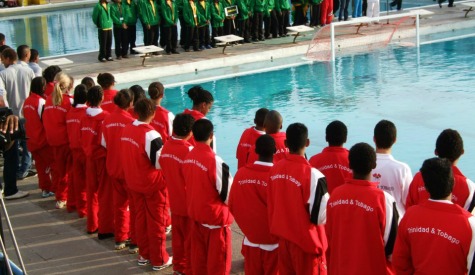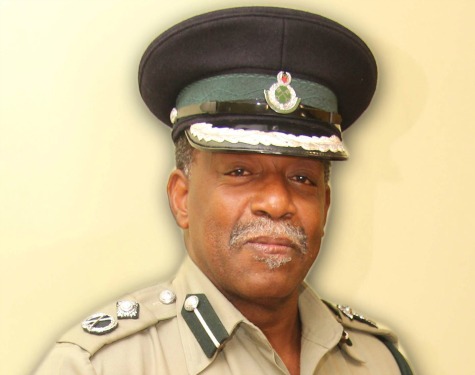 The Trinidad and Tobago Olympic Committee (TTOC) has submitted its entire roster for the 2015 Pan American Games, which will be held from July 10 to July 26 in Toronto.
The Trinidad and Tobago Olympic Committee (TTOC) has submitted its entire roster for the 2015 Pan American Games, which will be held from July 10 to July 26 in Toronto.
The entire Trinidad and Tobago team, which will be led by Chef de Mission Diane Henderson, is as follows:
Athletics: Keston Bledman, Marcus Duncan, Rondel Sorrillo, Mikel Thomas, Emmanuel Callender, Dan-Eil Telsford, Kyle Greaux, Machel Cedenio, Emanuel Mayers, Elton Walcott, Steve Waithe, Quincy Wilson, Emmanuel Stewart, Shakeil Waithe, Renny Quow, Jarrin Solomon, Lalonde Gordon, Jehue Gordon, Keshorn Walcott, Kelly- Ann Baptiste, Semoy Hackett, Reyare Thomas, Kamaria Durant, Lisa Wickham, Peli Alzola, Janeil Belille, Romona Modeste, Jessica James, Alena Brooks, Sparkle McKnight, Josanne Lucas, Ayanna Alexander, Deandra Daniel, Cleopatra Borel, Marsha Mark Baird;
Aquatics: George Richard Bovell III, Dylan Carter, Christian Marzden;
Badminton: Nicholas Bonkowsky;
Beach Volleyball: Daneil Williams, Fabien Whitfield, Ayana Dyette, Malika Davidson;
Boxing: Chimere Taylor;
Cycling: Njisane Phillip, Quincy Alexander, Jude Codrington, Justin Roberts, Varun Maharajh, Emile Abraham;
Football (Men): Montell Joseph, Shannon Gomez, Maurice Ford, Alvin Jones, Jesus Perez, Neveal Hackshaw, Jomal Williams, Tristan Hodge, Nathaniel Garcia, Kadeem Corbin, Shackiel Henry, Xavier Rajpaul, Dwight Quintero, Jelani Felix, Neil Benjamin, Dario Holmes, Aikim Andrews, Jovan Sample;
Football (Women): Kennya Cordner, Tasha St Louis, Karyn Forbes, Kimika Forbes, Maylee Attin-Johnson, Rhea Belgrave, Janine Francois, Arin King, Patrice Superville, Dernelle Mascall, Mariah Shade, Khadidra Debesette, Ayanna Russell, Ahkeela Mollon, Brianna Ryce, Shalette Alexander, Lauryn Hutchinson, Shenelle Henry;
Golf: Monifa Sealy, Christina Ferreira, Talin Rajendranath, Sachin Kumar;
Gymnastics: William Albert, Marisa Dick;
Hockey: Darren Cowie, Solomon Eccles, Shaquille Daniel, Mickel Pierre, Akim Toussaint, Che Modeste, Christopher Scipio, Dillet Gilkes, Jordon Reyos, Aidan De Gannes, Kiel Murray, Stefan Mouttet, Tariq Marcano, Andrey Rocke, Kristien Emmanuel, Ishmael Campbell;
Judo: Christopher George;
Sailing: Andrew Lewis, Kelly-Ann Arrindell.
Shooting: Marlon Moses, Anthony Maraj, Roger Daniel;
Taekwondo: Dorian Alexander.

 Japan set-up a rematch of the 2011 FIFA Women’s World Cup final with the United States as Laura Bassett’s late own goal handed them a tense 2-1 victory over England at the Commonwealth Stadium in Edmonton.
Japan set-up a rematch of the 2011 FIFA Women’s World Cup final with the United States as Laura Bassett’s late own goal handed them a tense 2-1 victory over England at the Commonwealth Stadium in Edmonton. Yuki Ogimi was the guilty party as she was pulled up for a foul on marauding full-back Steph Houghton and Williams followed Miyama’s lead, crashing home her penalty.
Yuki Ogimi was the guilty party as she was pulled up for a foul on marauding full-back Steph Houghton and Williams followed Miyama’s lead, crashing home her penalty. VETERAN TRINIDAD and Tobago rifle shooter Roger Daniel is bracing for the challenge he will expect at the Pan American Games, scheduled to take place in Toronto, Canada, from July 10-26.
VETERAN TRINIDAD and Tobago rifle shooter Roger Daniel is bracing for the challenge he will expect at the Pan American Games, scheduled to take place in Toronto, Canada, from July 10-26. …locals second on medal table, third overall
…locals second on medal table, third overall This country’s senior men’s hockey team continued its build-up towards the Pan American Games in Toronto, Canada later this month with 3-3 draw against host Mexico in Guanajuato, Mexico on Tuesday to conclude a four-match tour.
This country’s senior men’s hockey team continued its build-up towards the Pan American Games in Toronto, Canada later this month with 3-3 draw against host Mexico in Guanajuato, Mexico on Tuesday to conclude a four-match tour. Prisons Commissioner Sterling Stewart says NGOs like Vision on Mission (VoM) were very important for the reintegration of ex-offenders into society.
Prisons Commissioner Sterling Stewart says NGOs like Vision on Mission (VoM) were very important for the reintegration of ex-offenders into society.